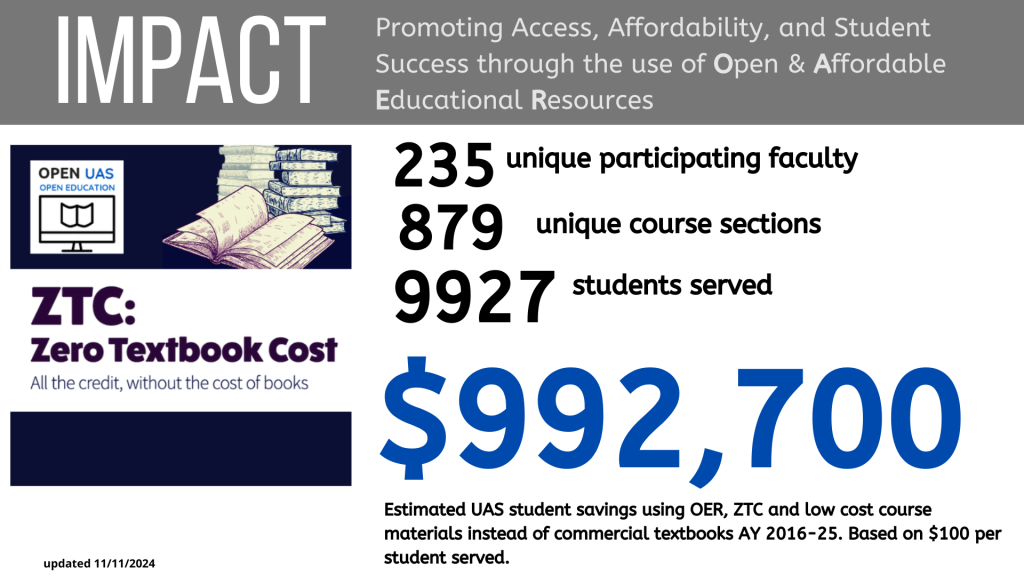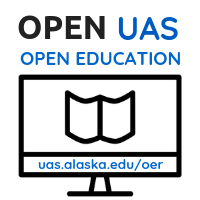I have provided leadership and advocacy for open education and course materials affordability at the University of Alaska Southeast (UAS) since 2016 through an ad-hoc, library-led initiative called Open UAS. Steps were taken to formally institutionalized this work in 2024 when my job title was updated to include Open Education Librarian.
To support the initiative I have presented and led workshops for faculty on OER and open pedagogy at convocation, department meetings, regional campuses, the UAS Teaching and Learning Technologies Roundtable and the Center for Excellence in Learning and Teaching (CELT). I have collaborated with faculty at partner universities on a grant proposal (unfunded) that outlined a system-wide open education initiative (OER @ University of Alaska) to include development for faculty at all three universities and strategic and operational planning support through a consortial membership in the Open Education Network. Despite the disappointment of not receiving funding, partnering with colleagues on this proposal brought to light an abundance of faculty expertise, energy and interest in open educational practices and a common vision for the benefits these practices would provide our students in terms of access, affordability and engagement.
I’ve learned to accept the hard lesson that change making is slow. I’ve been advocating for the development of formal open practices on campus tirelessly and am still only making ripples and finding allies. The most substantial challenges I continue to face in building an open education program is that of legitimacy and sustainability.
Those of us working in this arena are working against a legacy of commercial publishing, sage on the stage pedagogy and the significance placed upon seminal texts. However, I frequently remind myself that even small changes can have an impact and lay the groundwork for future changes. I recently contributed a case study of this work, including the many additional challenges I’ve encountered to the open monograph, The Evolution of Affordable Content Efforts in the Higher Education Environment: Programs, Case Studies, and Examples (UMN Libraries Press, 2018).
Beyond Alaska I’ve engaged with the work of SPARC (Scholarly Publishing and Academic Resources Coalition), primarily through their Libraries & OER Forum (LibOER), a vibrant community of practice for academic and research librarians interested in open education. I participated in a faculty learning community on open pedagogy through Kwantlen Polytechnic University in British Columbia where I also served as a visiting Open Education Scholar in Spring 2024. I am a graduate of the inaugural cohort of the Open Education Network’s Certificate in OER Librarianship. During the program I created an OER Action Plan to guide the near term goals for Open UAS. I”m one of 3 Alaska participants in the WICHE OERWest Network and have attended annual convenings in Arizona and Nevada (2023, 2024). In 2024 I completed the Certificate in Creative Commons for Academic Librarians.
I am incredibly proud of the work that has begun at UAS, due in part to my leadership, however I recognize that the work is not adequately supported at the institutional level so as to be sustainable. On our small campus, academic programs are often developed and discontinued on the back of one faculty member.
Recent Program Highlights (2024)
- UAS implement Zero Textbook Cost (ZTC) section marking, enabling students to search and identify course sections that have zero textbook costs at the point of registration (2022)
- recipient of the Faculty Excellence Award for Open Educational Practices (2024).
- technical assistance and input on a transition to a new bookstore provider to ensure ZTC course marking workflows are preserved in new faculty textbook adoption procedures (2024).
- developing procedures in consultation with faculty stakeholders and colleagues at UAA and UAF for Low Textbook Cost course marking (2024-25).
- provided input/consultation to the OER Affordability and Acceleration: Course Materials, OER, and Open Pedagogy working group as a component of the First Quinquennial Statewide Symposium on Effectiveness in First-Year Writing (2024).
- Invited along with other UA Affordability advocates to provide feedback and technical assistance on the Textbook Cost Transparency Act introduced during the 32nd Legislature (2021-2022) by Senator Robert Meyers and cosponsored by Sens. Begich, Stevens, Hughes and Micciche. The law was enacted in September 2024 and is effective July 1, 2026.
- 108 faculty champions recognized in AY 23-24 for their adoption of OER or ZTC materials.
- NoLo Cost Course Designation Project: Faculty Senate, Provost & Student Government (this would promote availability of free and affordable course materials to students).
- Creation of Award for Faculty Excellence in Open Educational Practices: Chancellor, Provost, Library Dean, Faculty Senate.
- Recognition of Faculty OER Champions for AY20-21: OER lead, department Chairs, Deans. Recognition letters provided to twenty two faculty members adopting open or affordable course materials in 54 unique courses saved 720 students $67,000 in course materials.
- Renewed Student Government Support: On March 17, 2021, SG UAS Juneau Campus passed Resolution 1920-16 “In Support of Textbook Affordability Efforts at UAS.” This resolution renewed a 2019 resolution to encourage efforts to reduce the cost of required course materials for students and included an endorsement of proposed No/Low Cost Course Marking.
- Fall 2020 Open Educational Network OER workshop: Fourteen faculty participated, 4 completed reviews and received a $250 professional development stipend funded through an Academic Innovation Award from the Provost’s Office.
- UAS team selected to participate in the AAC&U OER Institute (2021-22): a year-long, online engagement opportunity for teams from campuses or state systems seeking to actualize an ambitious strategy to broaden campus engagement with and adoption of OER. Participation will be funded as a strategic priority from the Provost’s Office.


